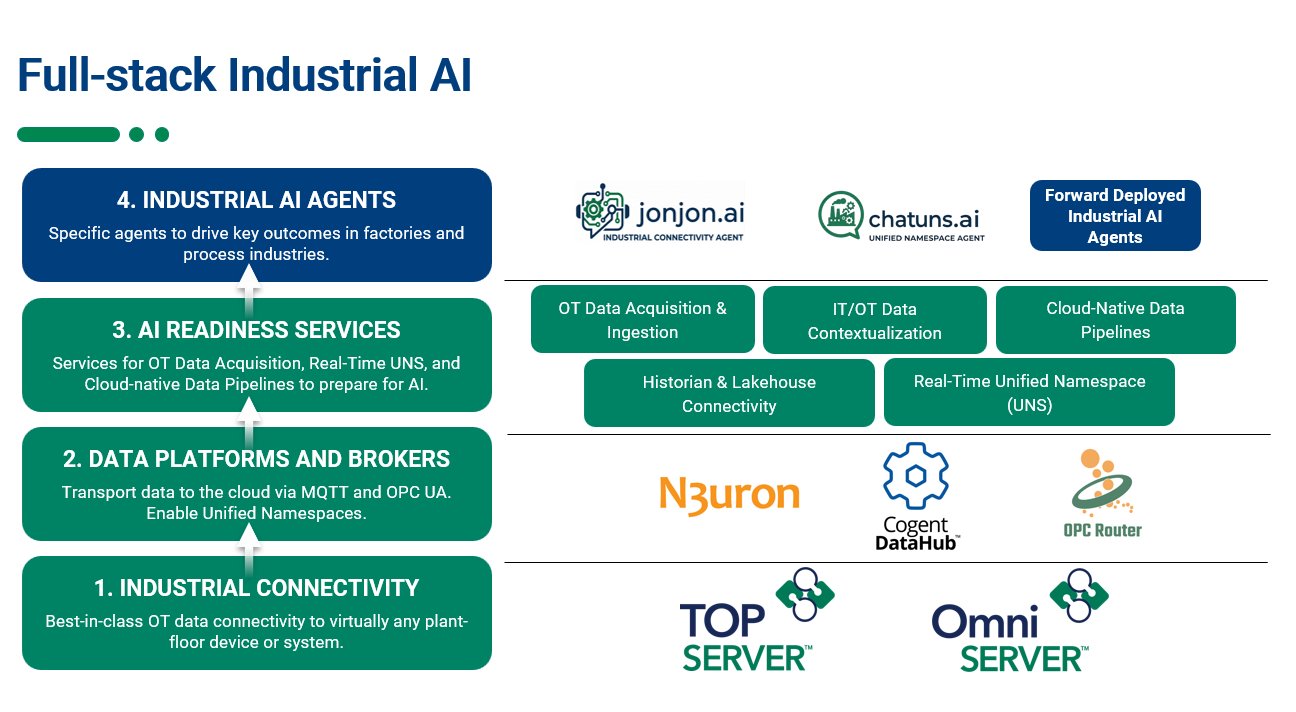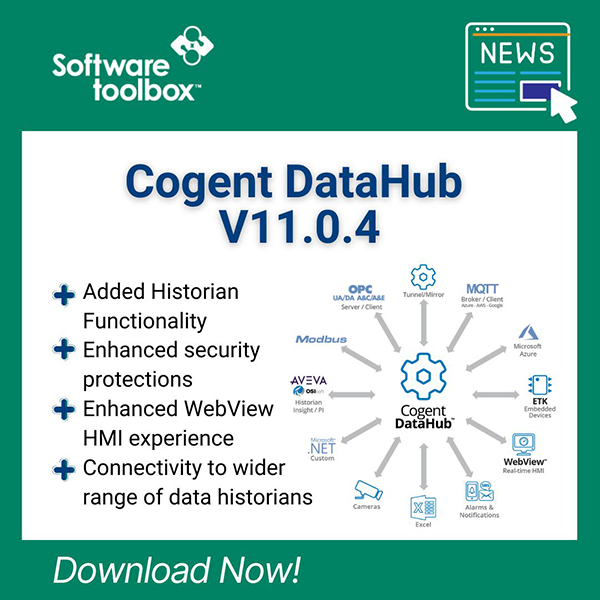The TOP Server OPC server is known for its ability to collect real-time data from a wide range of devices, using off-the-shelf industry standard protocols. However, challenges arise when not all devices can consistently share data in real-time due to limitations in connectivity mediums or networks. This is particularly evident in critical SCADA-heavy industries like Power & Utilities, Renewable Energy, Oil & Gas and Water/Wastewater, where precise control of polling is crucial due to their limited bandwidth availability. With traditional cyclic polling, for example "once an hour", you can end up with high bandwidth utilization at the top of an hour and the communications link being idle the rest of the time. Rather than do that, it's better to spread that usage out over the full hour.
The TOP Server Scheduler Plug-In is used to accomplish this spreading out of polling. With it, users can create a customized polling schedule for these devices for any TOP Server driver, which in turn optimizes communications between your SCADA, HMI, MES, or Historian and devices in the field. This eliminates the need to rely on your client applications or direct device configurations to achieve reliable collection crucial operational data from field devices.
The TOP Server Scheduler Plug-In empowers users to configure custom schedules for retrieving device tag data. For example, imagine configuring a schedule to gather statuses from four subsets of well sites every 15 minutes, synchronized within the hour, versus trying to poll them all at the top of the hour. Users choose the schedule intervals and what tags/devices to poll per schedule interval. Once collected, this data becomes readily available to all client applications.

Unlike conventional approaches that often rely on client-requested scan rates to dictate device polling, this plug-in centralizes control within the same application as your protocol driver configuration, thus streamlining the data collection process ensuring efficient utilization of resources and maximizing the value extracted from device networks.
In this blog, we highlight the Scheduler Plug-In configuration properties with examples on how they can be used in production scenarios to help you understand how this plug-in can help you optimize your data collection processes.
Scheduled Recurrences
The TOP Server Scheduler Plug-In allows you the flexibility to configure polls to happen at a:
- Specified Interval with a Start Time: where the specified interval can be set to second, minutes, or hours. This is the default for Recurrences.
- Specific Time: where a single poll occurs daily at the specified local time.

The Recurrences apply to any devices that are added to your configured Schedule.
In the example below, we have configured Recurring Polls for each Recurrence Type – one every 5 minutes starting at 12:00 AM, and the other at 3:38 PM every day.

After connecting a client application, the event log displays helpful events for when the polling will occur. We see our interval poll recurrences every 5 minutes as highlighted in green, and our daily poll highlighted in yellow stating when the next recurrence will be. We also observe events for when a scheduled poll starts and completes successfully.

Scheduled Exceptions
There may be times where you do not want to poll devices for various reasons. This could be things such as maintenance down times, or when you know the communication network bandwidth will be occupied with other polls. Or maybe something as simple as not needing to collect data over the weekend. In such cases, the TOP Server Scheduler Plug-In offers customized exceptions, allowing you to schedule specific times to prevent specific devices from being polled. There are two available Exception Types:
- Period: where you can specify a span of time range for when you do not want/need the device(s) to be polled
- Day of Week: where you specify a day of the week (by name) when you do not want/need the device(s) to be polled

Below, we've added a couple Exceptions to expand our same configuration. We are now preventing device polls from 10:00:10 AM to 10:05:00 AM every day, and excluding Wednesdays completely (configured after Period Exception was demonstrated).

This time in the TOP Server event log, we see the Scheduler enter (yellow highlight) and exit (green highlight) the exception period at our designated start and end times. The recurring poll that is attempted at 10:05 AM is ignored (shown underlined in red) because it fell within our exception period. The Recurrences then resume as normal at 10:05:01 AM once the exception period has past.
The Day of the Week exception was configured to not poll on Wednesdays in the pink at 10:15:15 AM after the Period Exception was demonstrated, every recurring schedule will be ignored for the remainder of the day.

Real-Time Schedule Override
Lastly, the TOP Server Scheduler Plug-In includes an "Override" mode feature, which enables temporary prioritization of device polling without altering the regular schedules. In this mode, the device is polled more regularly under the highest priority using the "Real-Time Schedule Override (sec)" as the poll rate. When enabled, this mode will override and ignore any Recurrences or Exceptions added to your Schedule.
The override poll interval is configured in the properties of the created schedule, as seen below.

The Real-Time Override is then enabled in the Device configuration of your Schedule to allow control on a per-device level.

Let’s look at the Real-Time Override in action:

Here are some observations we made from this:
- The Event Log shows when the Override is enabled for our device, as highlighted in green, indicating that the override function is active.
- The Recurrences that were supposed to occur at 5-minute intervals (10:10 and 10:15 AM) failed, marked in yellow, which illustrates how the configured Recurrences and Exceptions are disregarded.
- Our OPC Quick Client displays tag values with a timestamp of 11:15:35 AM, further showing that the override allowed for device polling to occur every 5 seconds rather than what was specified in the Schedule.
Conclusion
In conclusion, while the TOP Server excels in real-time data collection across a diversity of devices, challenges arise in industries where there are connectivity limitations. The Scheduler Plug-In addresses this by providing a centralized solution across industry specific drivers and regular PLC/controller drivers, allowing for customized polling schedules, which optimizes data retrieval without dependance on client applications or custom device configurations. This plug-in empowers users to configure custom schedules for data retrieval, streamlining the process and maximizing resource efficiency.
In this post, we focused on Recurrences, Exceptions, and the Real-Time Override, but the depth of functionality included in the Scheduler Plug-In does not stop there. The plug-in also supports:
- Special system tags for triggering on-demand polls, enabling/disabling a schedule and for monitoring schedule status from a client application.
- Customizable synchronization when Daylight Saving Time is a factor.
- Configurable priorities between different schedules in the event of a conflict
- Support for static device tags or device address references (dynamic tags)
- Device Wizard for quickly and easily adding identical sets of tags for multiple devices.
- CSV Import/Export for mass configuration.
This blog was intended to be an introduction to the TOP Server Scheduler Plug-In. If you wish to dive deeper into TOP Server and its wide range of features, we recommend exploring our TOP Server Learning Resources. Additionally, do not hesitate to reach out to our team to discuss your project requirements and determine if the Scheduler Plug-In is the right solution for your needs.
Remember to subscribe to our blog for the latest TOP Server updates, along with helpful tutorials and resources.
Want to get started with an easy-to-configure and flexible device polling engine? Get started with TOP Server today!






